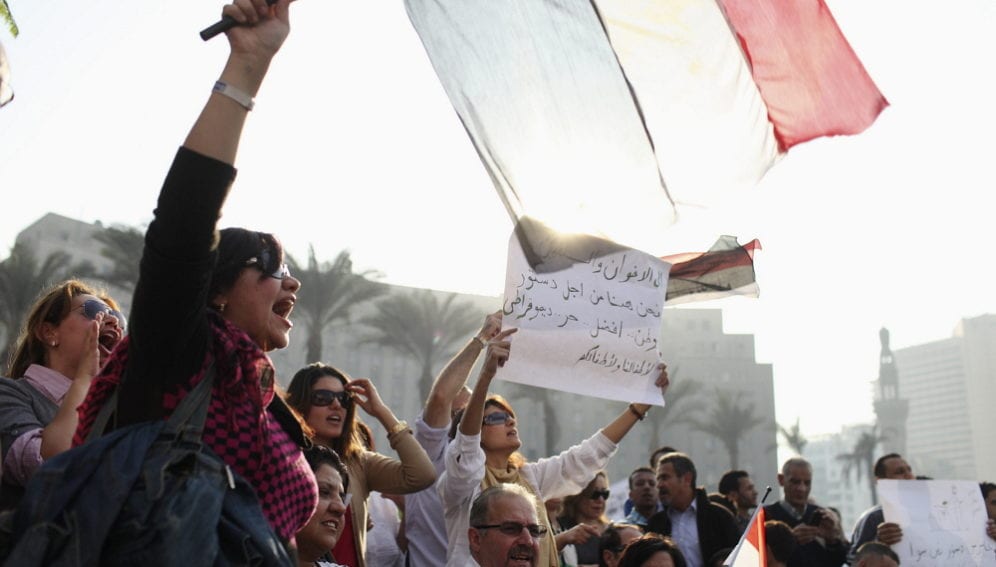By: Hazem Badr
Send to a friend
The details you provide on this page will not be used to send unsolicited email, and will not be sold to a 3rd party. See privacy policy.
[CAIRO] Egyptian researchers have raised alarm over news that the government, before it was unseated by the military, failed to spend a quarter of the one billion Egyptian pounds (about US$142 million) promised to research in a funding hike last year.
On top of concerns about the army's removal of Egyptian president Mohamed Morsi last week and the formation of a new, interim government, researchers are also worried that promises of increases in science funding made since the revolution that brought Morsi to power as the first elected president are failing to materialise on the ground, as some of the extra funding has remained unavailable to them.
Critics have blamed the Ministry of State for Higher Education and Scientific Research for the delay in spending the funds, while the ministry says the National Investment Bank (NIB), which oversees the disbursement of state funds, and the laws governing this process are responsible for the hold-up.
Yet both parties agree that the research system needs new laws and management strategies to make use of any funding rise.
Hany El Nazer, former president of the National Research Centre (NRC), first brought the underspend to light in an article published on 14 May in the Egyptian Al-Ahram Al-Massai newspaper.
The NIB's annual statement, which El Nazer says he obtained a copy of, showed that the science ministry had spent 189 million Egyptian pounds (nearly US$27 million) of its total budget for the fiscal year that ended on 30 June — equivalent to only around 19 per cent of its total budget.
The unspent funds were supposed to have been used to buy equipment and chemicals for research studies, he wrote.
El Nazer tells SciDev.Net that the science ministry "is responsible for the failure to complete important research projects" and that its "claim that the NIB is responsible for the delayed spending is an unacceptable excuse".
“The ministry has provided justifications that seem logical. However, I sense a problem by our inability to spend it on important research projects.”
Shaban Abou Hussein
He says: "The minister of scientific research is responsible for the budget review of all research centres and has the authority to transfer a portion of the budget from centres with a surplus to the centres that need it".
Current NRC president Ashraf Shaalan says: "In the past, the money was transferred directly to research centres and the centres would spend it according to their needs, but now our needs are being met at a slower rate due to complicated legal procedures related to the disbursement of money from the NIB."
Shaban Abou Hussein, an associate professor at the NRC's Agricultural and Biological Research Division, says: "The ministry has provided justifications that seem logical, including spending delays caused by bureaucracy. However, as a researcher, I sense a problem, as evidenced by our inability, despite the availability of money, to spend it on important research projects, such as the one I am a part of, concerned with the development of the Sinai peninsula."
But Nadia Zakhary, the minister of scientific research, tells SciDev.Net: "The figures in the table that was published in the press have not been updated and do not include [the money] recently spent by the ministry on bids and tenders for the purchase of new equipment".
She also points out that various tenders had been cancelled because of the continuous fluctuations in US dollar exchange rates [affecting imported equipment and materials?] and the wave of strikes and sit-ins that have hit Egypt over the past year.
Mahmoud Sakr, executive director of the science ministry's Science and Technology Development Fund, tells SciDev.Net that 75 per cent of the budget was spent by the end of the 2021/13 fiscal year.
This means a quarter of the money earmarked for research has not been spent and will be returned to government's coffers, while the budget for the next fiscal year remains the same.
Sakr admits there are other obstacles preventing researchers from taking full advantage of the available financial resources.
"We still have to buy research centre equipment in accordance with legal tender guidelines," he says.
Another obstacle, he says, is the fact that research centres and governmental entities are banned from importing equipment and chemicals directly and must instead do so through a local intermediary.
"This increases the price of imported goods by 600 per cent," says Sakr.














